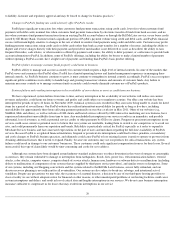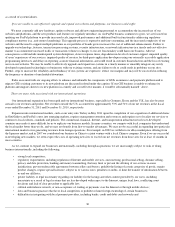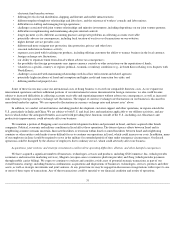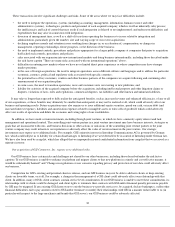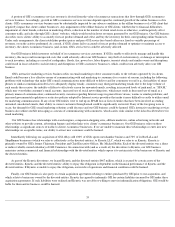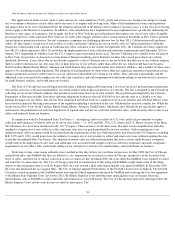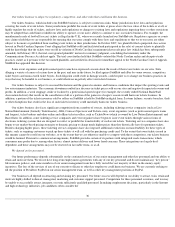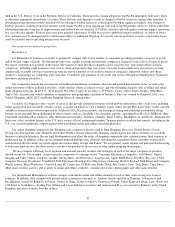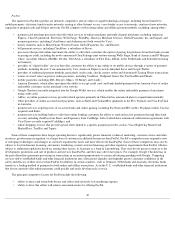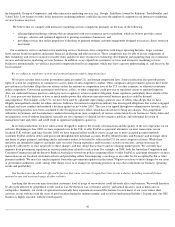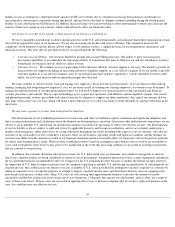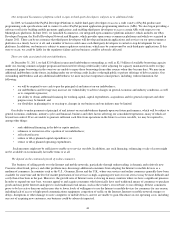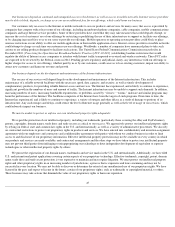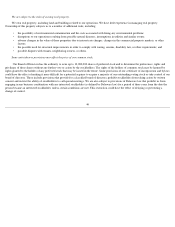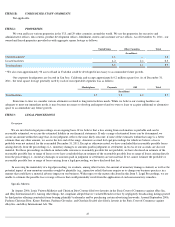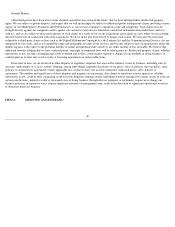eBay 2011 Annual Report Download - page 44
Download and view the complete annual report
Please find page 44 of the 2011 eBay annual report below. You can navigate through the pages in the report by either clicking on the pages listed below, or by using the keyword search tool below to find specific information within the annual report.
countries, there are online sites that have much larger customer bases and greater brand recognition than we do, as well as competitors that may
have a better understanding of local culture and commerce than we do. As our businesses in less-developed countries grow, we increasingly may
compete with domestic competitors which have advantages we do not possess, such as a greater ability to operate under local regulatory
authorities.
The principal competitive factors for Marketplaces include the following:
With respect to our online competition, additional competitive factors include:
We may be unable to compete successfully against current and future competitors. Some current and potential competitors have longer
operating histories, larger customer bases and greater brand recognition in other business and Internet sectors than we do. Other online ecommerce
sites may be acquired by, receive investments from, or enter into other commercial relationships with well-established and well-financed
companies. As a result, some of our competitors with other revenue sources may be able to devote more resources to marketing and promotional
campaigns, adopt more aggressive pricing policies and devote substantially more resources to website and systems development than we can.
Some of our competitors may offer or continue to offer free shipping, favorable return policies or other transaction-
related services which improve
the user experience on their sites and which could be impractical or inefficient for eBay sellers to match. New technologies may increase the
competitive pressures by enabling our competitors to offer more efficient or lower-cost services.
In addition, certain established retailers may encourage manufacturers to limit or cease distribution of their products to dealers who sell
through online channels such as eBay, or may attempt to use existing or future government regulation to prohibit or limit online commerce in
certain categories of goods or services. For example, manufacturers may attempt to enforce minimum resale price maintenance arrangements to
prevent distributors from selling on our websites or on the Internet generally, or at prices that would make our site attractive relative to other
alternatives. The adoption by manufacturers of policies, or the adoption of new laws or regulations or interpretations of existing laws or
regulations by government authorities, in each case discouraging the sales of goods or services over the Internet, could force eBay users to stop
selling certain products on our websites. Increased competition or anti-Internet distribution policies or regulations may result in reduced operating
margins, loss of market share and diminished value of our brands. As we respond to changes in the competitive environment, we may, from time
to time, make pricing, service or marketing decisions or acquisitions that may be controversial with and lead to dissatisfaction among some of our
sellers, which could reduce activity on our websites and harm our profitability.
Although we have established Internet traffic arrangements with several large online services and search engine companies, these
arrangements may not be renewed on favorable terms or these companies may decide to promote competitive services. Even if these arrangements
are renewed, they may not result in increased usage of our sites. In addition, companies that control user access to transactions through network
access, Internet browsers, mobile networks or search engines could promote our competitors, channel current or potential users to their vertically
integrated electronic commerce sites or their advertisers' sites, attempt to restrict access to our sites, or charge us substantial fees for inclusion.
Search engines are increasingly becoming a starting point for online shopping, and as the costs of operating an online store continue to decline,
online sellers may increasingly sell goods through multiple channels, which could reduce the number and value of transactions these sellers
conduct through our sites.
39
•
ability to attract and retain buyers and sellers;
•
volume of transactions and price and selection of goods;
•
trust in the seller and the transaction;
•
customer service; and
•
brand recognition.
•
community cohesion, interaction and size;
• website ease-of-
use and accessibility;
•
system reliability;
•
reliability of delivery and payment;
•
level of service fees; and
•
quality of search tools.


